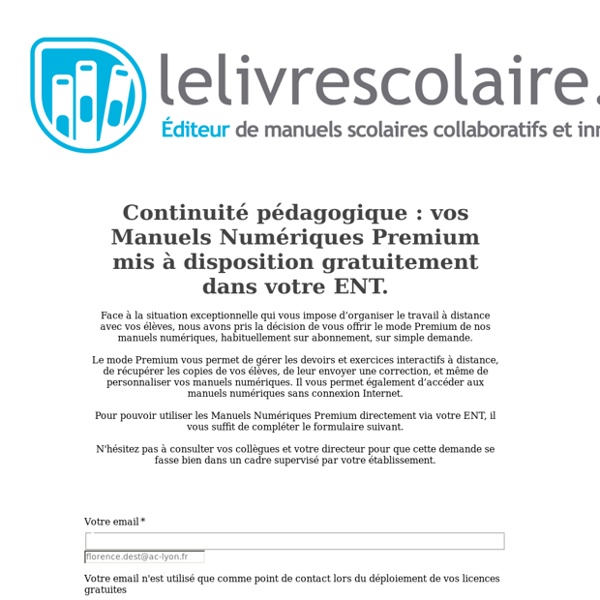



BORDAS s'engage pour assurer la continuité pédagogique Afin de faciliter la mise en place de cours à distance, tous les enseignants de France pourront désormais utiliser librement notre plateforme d'entraînement numérique ViaScola avec les ressources Bordas Accompagnement Numérique Personnalisé pour toute la classe ! Cet accès sera disponible pour toute la fin de l’année scolaire et permettra à vos élèves de bénéficier de ressources numériques à utiliser en autonomie ou guidés par vos instructions : Pour vos élèves, ce sont 110 000 ressources disponibles du CP à la Terminale : fiches de cours, vidéos, animations, tests de niveaux, exercices interactifs autocorrectifs à réponse personnalisée et de difficulté progressive (QCM, glisser-déposer, relier, textes à trous) et entraînement à l’examen. Pour vous, enseignants, vous avez la possibilité d'assigner des exercices et de créer des devoirs, à distance, pour vos élèves. Vous aurez également accès à un tableau de suivi pour voir en un clin d'oeil les résultats individuels et collectifs !
Comment peut-on utiliser Khan Academy à distance pendant la fermeture des écoles ? – Khan Academy Centre d'aide Read this article in another language: Հայերեն, български, 简体中文, čeština, Español, Français, ქართული, italiano, 日本語 , 한국어, Magyar, po polsku, Português (Brasil), Português (Portugal), svenska, русский, Türkçe Chers parents, chers enseignants, Au vu de l'inquiétude grandissante au sujet du coronavirus (COVID-19), nous savons que beaucoup d'entre vous se préparent à l'éventualité de poursuivre un apprentissage en dehors des écoles, si elles venaient à fermer. En tant que parents et enseignants nous-mêmes, nous savons que la situation vous préoccupe, qu'il s'agisse de votre santé, votre sécurité, la garde de vos enfants ou votre emploi. Nous ferons tout notre possible pour vous accompagner. Nous sommes une association sans but lucratif qui propose des ressources éducatives gratuites. Nous organisons chaque jour (de la semaine) un Facebook live à 10h10 CET sur Facebook pour les élèves, parents et enseignants qui doivent gérer la fermeture des écoles. Parents Enseignants Par où commencer :
Papiers Crayons, réédition 2019 (numérique) Papiers Crayons est un recueil d’activités de dessin sur quadrillage et de construction à la règle et au compas, publié par l’IREM de Paris-Nord en 2005. Afin de faire vivre cet ouvrage, l’équipe actuelle a décidé de le rééditer en utilisant des outils de publications récents. Ainsi, l’ensemble des activités sont retravaillées, quelques unes sont ajoutées, la progression est parfois modifiée mais toujours dans le respect de l’esprit de l’ouvrage original. Nous avons fait le choix de proposer l’ensemble des activités de Papiers Crayons sous forme de fichiers pdf monochromes et optimisés pour l’impression. Nous estimons en effet que la qualité visuelle d’une activité est essentielle à fortiori quand il s’agit de géométrie.
Parcoursmétiers Ici, les jeunes s'adressent aux jeunes! Dans le cadre de la crise sanitaire et parce que notre mission est d’aider les jeunes, du collège à l'université, à avoir un déclic pour un projet, un métier, une formation qui peut lui plaire, nous mettons gratuitement (1) tous les contenus et fonctionnalités de parcoursmetiers.tv à disposition des élèves, enseignants, parents. Sous le haut patronage des ministères de l'Education nationale et de la jeunesse, de l'Enseignement supérieur et de la recherche et du Travail, plus de 700 000 jeunes avec l'aide de 40 000 enseignants et 3 500 entreprises dans 28 pays ont réalisé plus de ces 5 000 vidéos sélectionnées avec leurs visions des métiers et des formations. Ce sont tous ces contenus inédits et plebiscités par les jeunes et éditorialisés, qui constituent PARCOURSMETIERS.TV. Ici, les jeunes s'adressent aux jeunes! > Créez mon compte > Vous avez déjà un compte ? > En savoir plus >> Lire l'article complet sur le site de l'auteur
Anglais : 32 modules Overseas Impressions en accès libre Développez les compétences de vos élèves en compréhension de l’oral et faites-leur découvrir le monde anglophone grâce aux modules Overseas Impressions. Pendant cette période de confinement, Réseau Canopé propose gratuitement et en accès libre les ressources et activités de 32 modules Overseas Impressions adaptées à l'enseignement à distance. Vous pouvez facilement indiquer à vos élèves quelles activités effectuer pour chaque module, en fonction de vos objectifs pédagogiques et de leurs besoins. Les modules sont classés par niveau : Toutes les solutions de soutien scolaire gratuit pendant la fermeture des établissements scolaires. On poursuit la série d’articles consacrés aux ressources en ligne utiles pendant cette période de confinement et de fermeture des établissements scolaires. En parallèle de l’immense travail réalisé par les enseignants, je vous propose de jeter un coup d’oeil du côté des plateformes qui proposent des cours ou du soutien scolaire en ligne. Voici une liste de toutes les solutions de soutien scolaire gratuit et de cours en ligne pendant la période de confinement. Attention plusieurs services ci-dessous sont habituellement payants et certains éditeurs ont conservé les offres payantes en parallèle. Lisez bien les conditions d’accès aux offres gratuites proposées par les opérateurs privés. Une liste à compléter avec vos apports. Mise à jour 31 mars – Ajout Le collège chez soi Mise à jour 30 mars – Ajout de Skilleos Mise à jour 25 mars – Ajout de PrepApp Mise à jour 24 mars – Ajout de Khan Academy et Nomad Education Assistance scolaire de la MAIF SchoolMoov Une des références du secteur. Maxicours